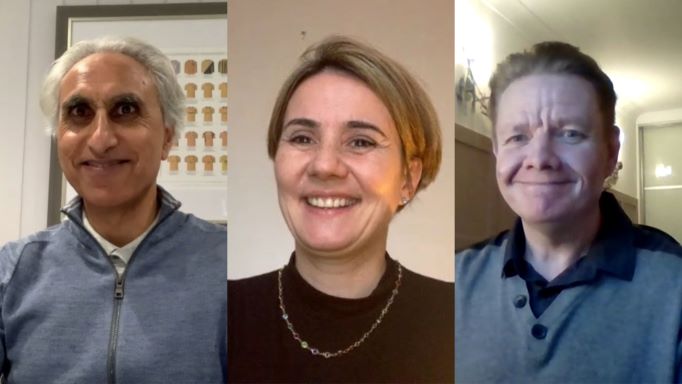 CLOUD
CLOUD
 CLOUD
CLOUD
 CLOUD
CLOUD
As in other parts of the world, vulnerable people in South Wales, England, experienced isolation and difficulties in getting the help they needed during the COVID-19 pandemic. So, Hafod, a non-profit organization that provides housing, care and support services in that area, decided to act.
It partnered with Accenture PLC and Amazon Web Services Inc. to craft and test a bespoke digital solution, called HomeCare, to keep people connected, maintain well-being, and offer support around other challenges of being isolated and lonely, such as with food and finances. The platform also aimed to overcome the challenges of access, affordability and skills related to technology, which have also been in the spotlight through the pandemic.
“I think that we have about 1,500 people living in households that are living alone and isolated … and so far, this is a two-prong journey,” said Jas Bains (pictured, left), group chief executive at Hafod. “One is about increasing the accessibility to tech and familiarizing people so that they’re comfortable with these devices technology and two, importantly, make sure that we have the right means to help people reduce their loneliness and isolation.”
Bains; Jamie Smith (pictured, right), co-founder and director of research and innovation at Hafod; and Laetitia Cailleteau (pictured, middle), managing director and global lead of conversational AI at Accenture PLC, spoke with John Furrier, host of theCUBE, SiliconANGLE Media’s livestreaming studio, during the AWS re:Invent Executive Summit. They discussed the features of the HomeCare platform, the technology solutions behind it, how artificial intelligence and analytics improve the physical and emotional well-being of the elderly, and the learning curve and privacy issues related to the service. (* Disclosure below.)
The HomeCare platform is designed to run on the AWS cloud and be accessed by voice through the Alexa device. The idea was to develop a solution as simple as possible so that even those who were not digitally literate could interact with it, according to Cailleteau. The platform is connected with a series of community services needed to support vulnerable people.
“In the particular case of Hafod, we had something around shopping during the pandemic, where we had people wanting to have access to their food bank,” Cailleteau explained. “There was some need for having access to financial coaching and things like that.”
The solution, a digital companion, also includes easy search and sign-up for virtual social engagements, seamless connection to estate management and caregivers, and programs to encourage healthy behaviors that positively impact physical and mental well-being.
While it is well known that technology cannot replace human interaction, it can complement the work of Hafod’s support teams, giving real-time access to vulnerable customers to make relevant interventions, according to Bains. Looking ahead, this should help to free up resources within Hadof’s team, enabling staff to focus on those who need services the most.
Behind the voice solution that helps people stay connected and get help, there is a lot of behavioral data capture and machine-learning algorithms to detect anomalies. The sooner a problem can be detected, the greater the chance of mitigating long-term, negative outcomes.
“That can raise a red flag in our system, and it alerts one of our neighborhood coaches just to reach out to that person and say, ‘Well, John, what’s going on? You haven’t been out for a walk for a few days,’” Smith said. “And these early warning signs are really important when we think of the long-term effects of loneliness and how getting upstream of those, preventing it reaching a point where it moves from being a problem into being a crisis.”
Despite the potential for using AI, the challenges are not small. As people are different and have diverse habits, there is no one-size-fits-all approach, and digitizing and automating these services is a challenge, according to Cailleteau.
“For me as an IT professional being in the industry for 20-plus years, I think this is the time where personalization has really a true meaning,” she said. “I think this is one of the cases that has to be powered by technology to complement the human side of it if we really want to start scaling the services we provide to people in general.”
Because of the efforts in the area, the solution has been awarded a patent for its hyper-personalized voice AI experience.
Watch the complete video interview below, and be sure to check out more of SiliconANGLE’s and theCUBE’s coverage of the AWS re:Invent Executive Summit. (* Disclosure: This segment was sponsored by Accenture PLC. Neither Accenture nor other sponsors have editorial control over content on theCUBE or SiliconANGLE.)
THANK YOU